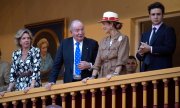Spain's former king Juan Carlos leaves the country
Spain's ex-monarch Juan Carlos I has apparently left the country and plans to live elsewhere in the future, as he states in a letter to his son and current monarch King Felipe VI published by the royal family on Monday. Despite his departure, Juan Carlos, who is under investigation for accepting bribes from Saudi Arabia, remains at the disposition of the Spanish judiciary, according to his lawyer. What are the repercussions of his departure?
A disservice to democracy
Juan Carlos left a letter to his son, King Felipe VI, in which he writes that he always wanted "the best for the country and for the Crown". But by leaving the country he is not doing anyone a favour, says El Periódico de Catalunya:
“He is doing it to preserve the monarchy's prestige, but the fact that he has chosen this type of exile neither serves this purpose nor will it help the current monarch to overcome the crisis. It would have been correct for him to leave Zarzuela Palace, but at the same time to place himself at the disposition of the justice system. ... By leaving the palace he has done a final service to the monarchy and democracy, but doing it by going into exile turns it into a disservice.”
Sad ending of a king who embodied transition
Juan Carlos's position had become untenable in the end, De Telegraaf notes:
“The woman who could become the nail in Juan Carlos's coffin is his ex-lover, German businesswoman Corinna Larssen, who will be called to testify against him. It was Corinna who revealed the existence of the bribe money in the first place. ... This is just one more part of the endless stream of sordid reports about the King. ... Now it seems to be the sad end of the man who was once put on the throne by Franco, but who then did an exemplary job of accompanying Spain on its path to democracy.”
Fight coronavirus instead of bickering over the crown
Spain has more important things to do than discuss abolishing the royal family, El País urges:
“Those who are now taking advantage of Juan Carlos I's fall from grace to fuel the debate about the monarchy should ask themselves whether the demand for a republic, in itself legitimate, currently has the necessary social and parliamentary consensus to be translated into a constitutional reform. The figures indicate the contrary. It would therefore be irresponsible to provoke an institutional crisis at a time when what the country needs is the stability to join forces and combat the devastating economic crisis and the looming crisis in healthcare services.”

